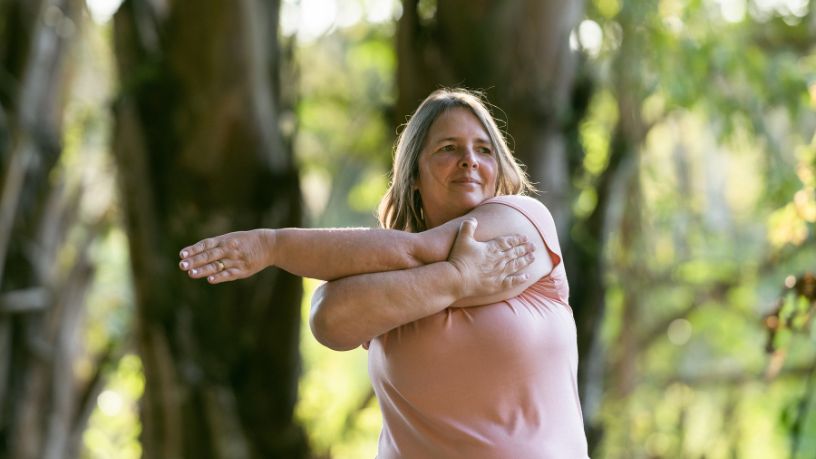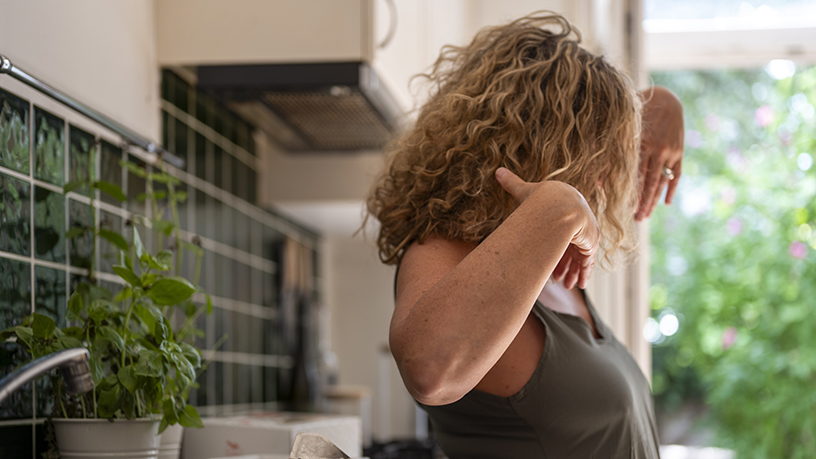On this page
Key takeaways
- Menopause impacts everyone differently, and symptoms can vary.
- Hormonal changes cause menopausal symptoms in most women.
- Smart lifestyle choices will support you while you manage the symptoms.
Menopause officially marks the time when you haven’t had a period for 12 months.
The average age for this to happen is around 51, but it can be later or earlier.
In the transitional period leading up to menopause, known as perimenopause, many women experience mild to severe physical and mental symptoms that can have a big impact on your day-to-day life.
Perimenopause typically begins after 40 and can last on average 4 to 6 years, but for some women up to a decade.
While your healthcare provider may recommend medication and complementary therapies to help manage your symptoms, there are also things you can do at home to support your health and well-being during this challenging time.
Keep moving
Maintaining a healthy weight during the menopause years can be helpful as there is evidence that weight gain, potentially due to a fall in oestrogen and a drop in your metabolic rate1, can increase the severity of menopausal symptoms.
Research has shown that high and moderate exercise levels can help ease, and even prevent, some menopausal symptoms.2
Resistance training, aerobic training and low-impact exercise such as yoga and swimming may help to:
- decrease the intensity of night hot flushes and night sweats
- increase bone density
- reduce the risk of osteoporosis.
Regular activity has also been shown to improve sleep quality which in turn can help to regulate mood swings, protect against heart disease and stroke, and limit weight gain during menopause as well as at other life stages.1
Always check with your GP if you’re starting a new exercise program when you haven’t exercised for a while.
Watch your diet
Maintaining a healthy diet through menopause will help to support your overall well-being and may help to counter some menopausal symptoms such as weight gain and fatigue.
A Mediterranean diet rich in fruit, vegetables, wholegrains, olive oil, nuts, seeds and fish, plus moderate quantities of dairy and red meat, is in line with the Australian Dietary Guidelines.
Research shows that a Mediterranean-style diet may have many health benefits for those who are peri- and post-menopausal, including3:
- reduced risk of cardiovascular disease
- reduced risk of breast cancer
- improved bone density if you have osteoporosis
- better overall mood and decreased symptoms of depression.
See your GP or an accredited practising dietitian for advice before making significant changes to your diet.
Eat for bone health
A drop in oestrogen during menopause puts you at a higher risk of osteoporosis.
Eating 1300mg of calcium per day can help to keep your bones strong and reduce that risk.4
Good sources of dietary calcium include:
- milk and dairy products
- tinned fish with bones, such as sardines and salmon
- tofu
- almonds
- sesame seeds (tahini)
- leafy green vegetables
Caffeine5 and alcohol6 can reduce the absorption of calcium, so it’s best to decrease your intake where possible or remove them from your diet.
Getting too much vitamin A over time may increase your risk of osteoporosis.7 It’s not common to get too much from food alone, but if you take multivitamins or supplements, it’s worth checking in with your doctor to make sure your levels are safe.
Get plenty of Vitamin D
Vitamin D is important for bone health before and after menopause. It’s produced naturally by your body when your skin is exposed to sunlight and can also be found in some foods. Vitamin D can also help regulate the growth of vaginal cells and reduce urinary and vaginal issues during and post-menopause8.
Despite our sunny climate, many Australians are low in vitamin D, so don’t take it for granted that your levels are good.
Due to Australia’s high rate of skin cancer and levels of ultraviolet radiation (UV), we often need to limit our exposure to the sun so you may need to seek out an alternative source. Vitamin D can be found in some foods, such as oily fish and eggs, or your GP may suggest a vitamin D supplement if they are concerned about your intake.
Note: Be sure to talk to your GP before taking vitamin D supplements, especially if you’re taking diuretics for high blood pressure or have a history of kidney stones or kidney failure.

Self-care starts with a checkup
Resources
Jean Hailes for Women's Health provides online resources and tips on how to stay healthy during menopause and manage your symptoms.
The Australian Menopause Society produces a series of fact sheets on the diverse aspects of menopause.

At Bupa, trust is everything
Our health and wellbeing information is regularly reviewed and maintained by a team of healthcare experts, to ensure its relevancy and accuracy. Everyone's health journey is unique and health outcomes vary from person to person.
This content is not a replacement for personalised and specific medical, healthcare, or other professional advice. If you have concerns about your health, see your doctor or other health professional.
1Better Health Channel. (2024). Menopause and weight gain. Victoria State Government, Department of Health.
2Dąbrowska-Galas, M., Dąbrowska, J., Ptaszkowski, K., & Plinta, R. (2019). High Physical Activity Level May Reduce Menopausal Symptoms. Medicina (Kaunas, Lithuania), 55(8), 466.
3Cano, A., Marshall, S., Zolfaroli, I., et al. (2020). The Mediterranean diet and menopausal health: An EMAS position statement. Maturitas, 139, 90–97.[BZ2]
4Australasian Menopausal Society. (2021). Calcium Supplements. Australasian Menopausal Society.
5University of South Australia. (2021). Caffeine cuts close to the bone when it comes to osteoporosis. University of South Australia.
6Godos, J., Giampieri, F., Chisari, E., et al. (2022). Alcohol Consumption, Bone Mineral Density, and Risk of Osteoporotic Fractures: A Dose-Response Meta-Analysis. International journal of environmental research and public health, 19(3), 1,515.
7Healthdirect. (2024). Vitamin A and your health. Healthdirect.
8Mei, Z., Hu, H., Zou, Y., & Li, D. (2023). The role of vitamin D in menopausal women's health. Frontiers in physiology, 14, 1211896.
You might also like
Menopause and joint pain
Hormonal changes during menopause can cause aches and pains in the joints. Learn more about how to reduce discomfort.
The lowdown on menopausal hormone therapy (MHT)
A closer look at menopausal hormone therapy and how it can help on your menopause journey.
Menopause: What it is and how to manage symptoms
What you need to know about menopause and how to manage the menopause journey.
Women's health snapshot: the issues that matter
Knowing what health conditions affect women can help you better manage your risk factors.





